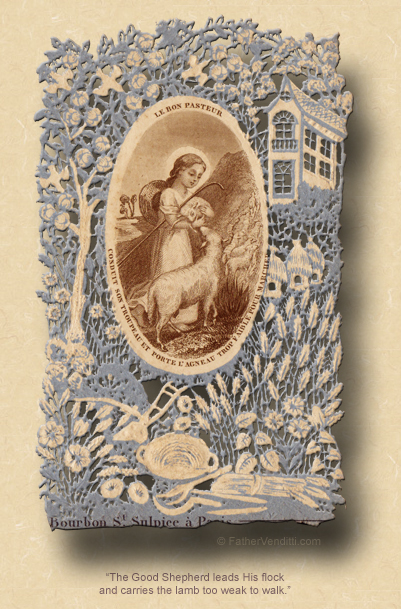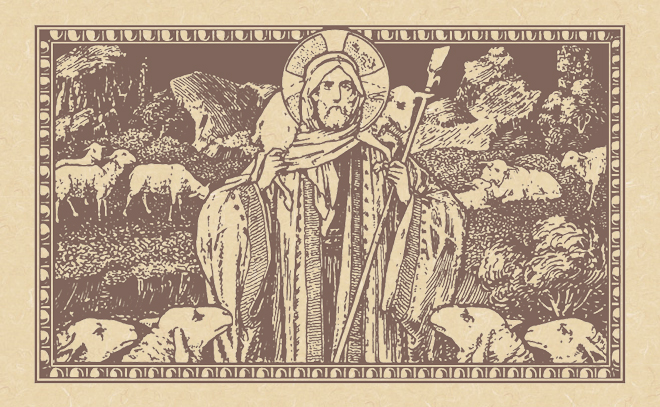What Do Our Lord and a Love-Sick Woman with Low Self-Esteem Have in Common?
The Thirty-First Thursday of Ordinary Time.
Lessons from the primary feria, according to the ordinary form of the Roman Rite:
• Romans 14: 7-12.
• Psalm 27: 1, 4, 13-14.
• Luke 15: 1-10.
The Twenty-First Thursday after Epiphany.
Lessons from the dominica,* according to the extraordinary form of the Roman Rite:
• Ephesians 6: 10-17.
• Psalm 89: 1-2.
• Matthew 18: 23-35.
FatherVenditti.com
|
 8:23 AM 11/7/2019 — The Holy Gospel is replete with instances of our Lord maneuvering Himself into the company of sinners and being castigated for it. Sometimes He answers the criticism and sometimes He doesn't. My favorite come-back is the one He uses when he invited himself to the home of the tax collector Zacchaeus: “It is not the healthy who need the physician” (Mark 2: 17 Knox). That was a one-liner; in today's Gospel lesson He's a bit more verbose and actually answers His critics with two parables: one about a shepherd who lost a sheep, and one about a woman who lost a coin. The bottom line is that something has been lost and must be found. 8:23 AM 11/7/2019 — The Holy Gospel is replete with instances of our Lord maneuvering Himself into the company of sinners and being castigated for it. Sometimes He answers the criticism and sometimes He doesn't. My favorite come-back is the one He uses when he invited himself to the home of the tax collector Zacchaeus: “It is not the healthy who need the physician” (Mark 2: 17 Knox). That was a one-liner; in today's Gospel lesson He's a bit more verbose and actually answers His critics with two parables: one about a shepherd who lost a sheep, and one about a woman who lost a coin. The bottom line is that something has been lost and must be found.
Teresa of Avila, in her own peculiar way,—and she could be peculiar at times—likens the zeal of our Lord for souls to the woman who is compelled by some defect of self-esteem to seek out the one man she can't have, as if attracting him presents a challenge to her vanity. She's not ascribing to our Lord the vanity; she's ascribing to Him the drive, the compulsion to pursue the one soul who has not come seeking Him. In the case of Zacchaeus, our Lord sees him in a tree and perceives that he's interested enough to try and get a better look, but would never approach our Lord on his own initiative; so, our Lord provides the initiative for him and rudely invites himself to Zacchaeus' house, in much the same way that a woman will scan the face of a man to see if he betrays some kind of hidden signal that he's attracted to her, the only difference being that the vain woman will often see signals that aren't really there. Saint Teresa actually puts herself in the woman's place, and meditates:
Ah, how hard a thing am I asking of Thee, my True God! I ask Thee to love one who loves Thee not, to open to one who has not called upon Thee, to give health to one who prefers to be sick and who even goes about in search of sickness (Exclamations of the Soul to God, #8).
You can see why the Spanish Mystics were suspect for a long time, as their highly romanticized verbal images require some maturity to process properly. More to the liking of the Church at the time was the more manly image provided by Pope Saint Gregory the Great, who likened our Lord's parables about the lost sheep and the lost coin to a commander in battle: the soldier who flees the field in cowardice, but who later has a change of heart and returns to the fray, is more valuable than the soldier who never ran away but who never displayed any particular valor either. Both images provide us with a way to view our own internal struggles. The most common complaint a priest hears in Confession from souls sincerely striving for perfection is how they are not making any progress, how they come to confess the same faults over and over again, how there never seems to be any light at the end of the tunnel.
Father Francis Fernandez, a priest of Opus Dei, reflecting on today's Gospel lesson, reminds us of why our Lord allows these struggles in our lives: in order to increase our desire for Him, which only happens if we successfully resist the added temptation to lapse into discouragement.
Whenever we begin again, [he says,] each and every day, our heart is filled with joy—and so is the Master's. Every time we allow Jesus to enter into our life we please God immeasurably. The Sacred Heart of Jesus “overflows with joy whenever a lost soul has been recovered.”**
At the beginning of this month we observed the remembrance of All Souls, and in a more Catholic age the words of the Dies Iræ from the Requiem Mass would be fresh in our minds: Quærens me, sedisti lassus: Redemisti Crucem passus: Tantus labor non sit cassus. “Lord, You have worn Yourself out looking for me: O, that Your labors will not have been in vain.”

* In the extraordinary form, on the ferial days outside of privileged seasons, the lessons from the previous Sunday are repeated.
** In Conversation with God, vol. 5, p. 399, quoting G. Chevot, The Gospel in the Open Air.
|

